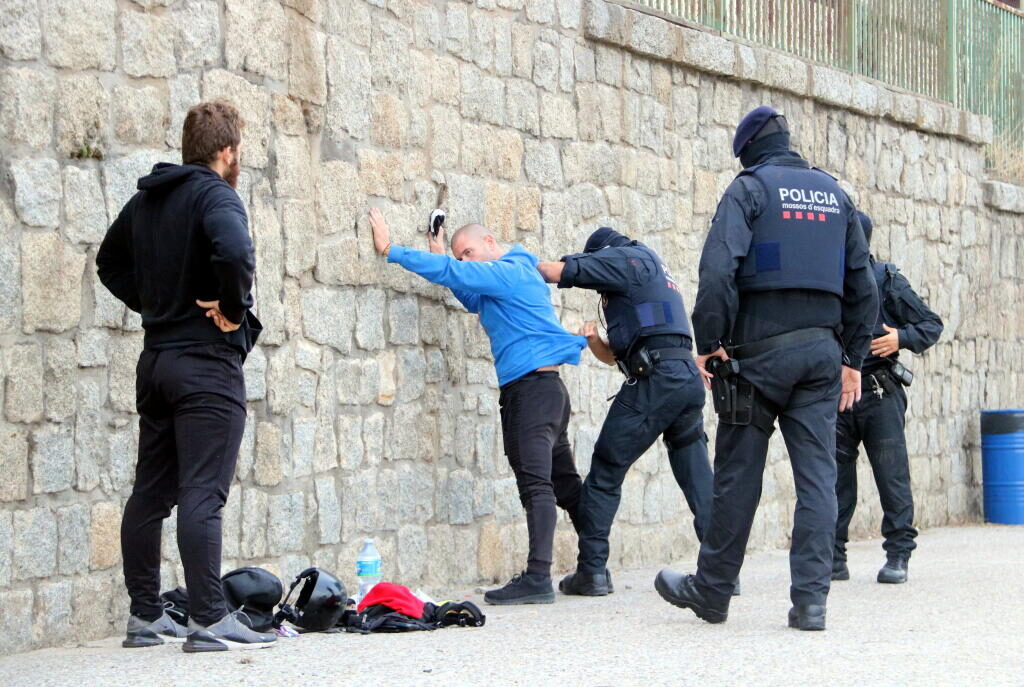02.11.2019 - 17:09
|
Actualització: 02.11.2019 - 18:09
Checking into prison comes as a relief. That is what many of the twenty-eight young detainees —twenty-seven after Paula’s release— felt after being arrested in the protests that erupted following the verdict in the case of the Catalan independence leaders. The hours that went by between the time of their arrest —in many cases, random and arbitrary, as their lawyers have pointed out— and their admission in prison were a dreadful ordeal for many of the detained demonstrators.
They spent up to forty-eight hours with almost nothing to eat, humiliated, beaten up and groped inside police vans as well as at the Via Laietana and La Verneda police stations. Strip searches while completely naked and medical examinations handcuffed under police supervision are but two examples of the degrading treatment the youngsters were subjected to, as recounted by members of Catalonia’s Observatory on the Penal System and Human Rights (OSPDH) who have visited them in jail to monitor their situation. The OSPDH operates in tandem with the SIRECOVI, a system of documentation and communication aimed at protecting victims of institutional violence.
SIRECOVI staff had visited a total of nine prisoners by last Wednesday and they will be meeting all of them in the coming weeks, with their written consent and that of their lawyers. They will also publish a report so that their testimony can be heard. The SIRECOVI will record the detainees’ accounts, without comment, in order to relay the reports of the alleged victims of abuse, torture and institutional violence to the relevant authorities, especially to the Council of Europe and the UN’s special rapporteur on torture, so that the incidents can be looked into.
The youngsters held on remand claim that in some cases up to fourteen or fifteen hours went by before their lawyers were notified of their arrest, which exceeds the length of time set by law. Many of the arrests were random and based on unspecific police reports that do not tie those under arrest to concrete events, a complaint made by several of the lawyers.
“Blood-splattered walls”
One of the most harrowing episodes, as told by the young detainees to members of the SIRECOVI, was when news got to the Spanish police station on Via Laietana that one of their colleagues was critically injured. This enraged the officers, who took it out on the male detainees with their batons. While the girls were on their knees and in handcuffs, the Spanish police officers beat up the male prisoners. One of the detainees spoke of blood-splattered walls. The Spanish police station at Via Laietana was famous during Franco’s dictatorship for being a torture centre.
In several cases, the detainees mentioned that they weren’t kept in holding cells but in an operations room of sorts, with incoming and outgoing officers who were on edge due to the rioting outside. As for body searches, in some cases they were stripped naked, even though the law states that prisoners must be given a gown to can cover up with.
Medical examinations weren’t conducted by the book, either. Speaking to SIRECOVI staff, the Catalan youths claim that police officers were present during their examination in the doctor’s surgery. This constitutes a violation of international law on the prevention of torture, as police supervision intimidates detainees and discourages them from speaking out to medical staff about who or what caused their injuries. Furthermore, the police kept the prisoners in handcuffs, even after the doctor had asked for them to be removed. A SIRECOVI member explains that one of the detainees, who had been hit in the leg with a baton, was stitched up with his hands handcuffed behind his back. In another instance, a detainee who had sustained an injury near his eye when a Catalan police officer hit him with a bottle had the gash stitched up while still in handcuffs and bloody-faced.
Humiliations and late night drives
The female detainees explained that the police threw them onto the floor of their vans. In fact, one of them split her lip as a result. They recounted that they were laid down between the seats and claim that some officers stepped on them with their boots, hurting their necks and bodies. One of them explained that someone felt her breasts, although she is unsure whether the groping was sexually motivated.
Being driven to a new location are always a dire affair. The detainees told SIRECOVI staff that they were forced to spend a long time inside the police vans on their way from the Via Laietana to the La Verneda precinct in the wee hours. Sometimes they lost track of time as a result. They recall feeling extremely hot and struggling to breathe, with some lying on the floor with their hands cuffed behind their back while other were seated without a belt on, so that the police’s reckless driving —speeding, then braking suddenly— meant they kept bouncing around inside the van.
The prisoners speak of actually feeling a modicum of relief upon being admitted into prison. They all agree that prison staff have treated them well enough, which is in stark contrast with the degrading treatment they received from the police. A fresh change of clothes, a shower and food after forty-eight hours of suffering.


